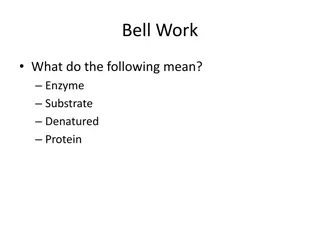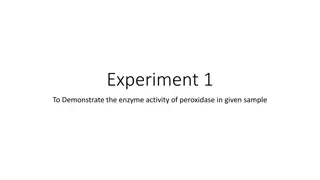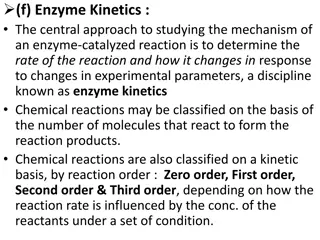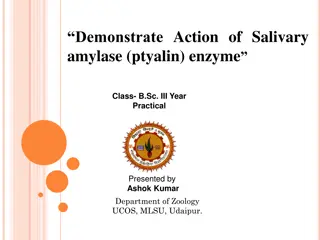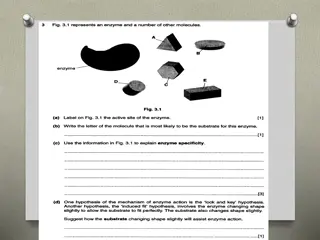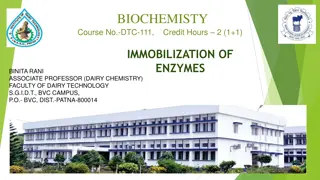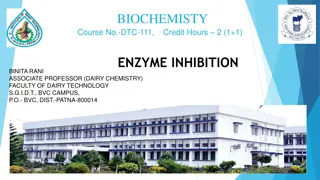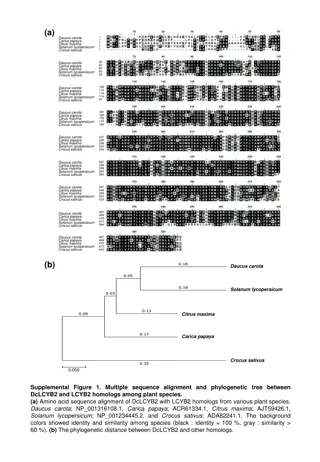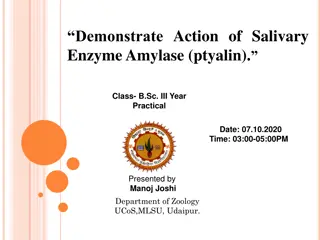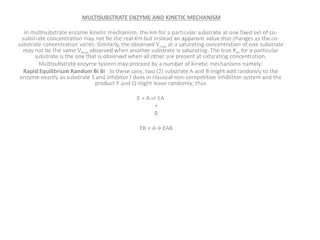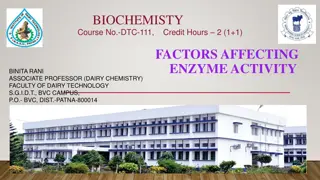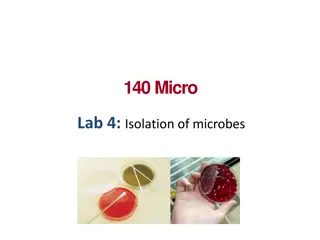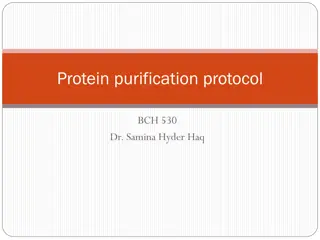Understanding the Role of Phosphatase Enzymes in Metabolic Reactions
Phosphatase enzymes play a crucial role in various metabolic processes by releasing phosphate groups, increasing their availability for energy synthesis and cell structure formation. Acid phosphatases, with an optimum pH below 7.0, can be extracted from plant tissues like germinating mung beans. A p
7 views • 34 slides
Understanding Enzyme Function Through Induced Fit Model
The learning content discusses enzymes as biological catalysts that increase reaction rates by lowering activation energy. It explores how enzyme activity efficiency is influenced by factors such as temperature, pH, and substrate concentration. The Induced Fit Model is analyzed to explain how enzyme
5 views • 12 slides
Guidelines for Setting up Isolation Facility/Ward for Covid-19 Management
Quarantine and isolation measures are crucial for breaking the chain of transmission in the community. Isolation involves separating individuals who are ill or suspected of having COVID-19, while quarantine is for those exposed and potentially at risk. Specific protocols and facilities are necessary
1 views • 33 slides
Understanding Isolation and Virtualization in Operating Systems
This text delves into the concepts of isolation and virtualization in operating systems. It covers topics such as virtual memory, virtual machines, containers, and kernel isolation mechanisms like chroot and cgroups. The discussion explores how these techniques provide isolation between processes, c
5 views • 20 slides
Investigating the Impact of Pineapple Enzyme Bromelain on Gelatin and Pasteurization Process
Explore the effects of pineapple enzyme bromelain on gelatin and how pasteurization can alter its effectiveness in this lab experiment. Discover the different outcomes when using fresh versus canned pineapple and formulate hypotheses to guide the investigation. Follow step-by-step procedures to test
0 views • 15 slides
Factors Affecting Enzyme Activity and Catalysis
Enzyme activity is influenced by various factors such as enzyme concentration, temperature, pH, substrate concentration, inhibitors, activators, and physical agents. The rate of enzyme-catalyzed reactions is directly proportional to enzyme concentration, and temperature plays a significant role with
0 views • 23 slides
Understanding Enzyme Function: The Key Steps and Importance of Cofactors
Enzymes play a crucial role in catalyzing biochemical reactions by forming enzyme-substrate complexes and facilitating changes in substrate molecules to product molecules. The process involves four steps: proximity of enzyme and substrate, binding at the active site, catalysis leading to substrate a
0 views • 39 slides
Revised Guidelines for Home Isolation of COVID-19 Cases in India
The Ministry of Health & Family Welfare in India has issued revised guidelines for home isolation of very mild/pre-symptomatic/asymptomatic COVID-19 cases. Patients eligible for home isolation must have the necessary facility for self-isolation. Special considerations apply to elderly patients and t
2 views • 16 slides
Updates to Isolation Index and Targeted Funding for Remote Schools
The Isolation Index introduced in 2001 to identify remote schools is being updated to better allocate funding based on isolation levels. Changes include using updated population and road data, redefining isolation criteria, and revising funding formulas. The goal is to accurately support the most is
1 views • 6 slides
Guidelines for Setting Up Isolation Area in Healthcare Facilities
Learn about the importance of isolating suspected Marburg virus disease patients in healthcare settings to prevent spread. Discover best practices for creating a short-term isolation area and the requirements for setting up an effective isolation space, ensuring the safety of patients and healthcare
3 views • 14 slides
Understanding Peroxidase Enzyme Activity in Biological Samples
Demonstrating the enzyme activity of peroxidase, an enzyme that plays a crucial role in breaking down hydrogen peroxide in various organisms. Learn about the differences between peroxidase and catalase, the calculation of enzyme activity, and the significance of extinction coefficient in enzyme assa
0 views • 8 slides
Understanding Social Isolation and Loneliness in Seniors
Social isolation and loneliness pose significant risks to seniors, increasing the likelihood of mortality, impacting both physical and mental health, contributing to cognitive decline, and raising vulnerability to elder abuse. Factors such as loss of spouse, lack of social contacts, transportation d
1 views • 18 slides
Understanding Prezygotic Reproductive Isolating Mechanisms
Prezygotic reproductive isolating mechanisms prevent mating or fertilization between different species before it can occur. Examples include habitat isolation, behavioral isolation, and temporal isolation. These mechanisms play a significant role in maintaining species integrity and preventing the f
0 views • 4 slides
Exploring Enzyme Kinetics for Understanding Chemical Reactions
Enzyme kinetics is a vital discipline focusing on the rate of enzyme-catalyzed reactions and how they respond to varying conditions. Reactions are classified based on reactant concentration influences. Zero, first, second, and third order reactions are distinguished, with examples like first-order r
0 views • 31 slides
Demonstration of Salivary Amylase Enzyme Action in B.Sc. Practical
Salivary amylase, an enzyme found in saliva, partially hydrolyzes starch into maltose. This practical involves observing the action of salivary amylase on starch, demonstrating how starch is broken down into glucose and maltose. The procedure includes preparing solutions, collecting saliva, mixing w
0 views • 5 slides
Enzyme Immobilization: Techniques and Applications in Industry and Healthcare
Enzyme immobilization involves confining enzymes on inert supports for stability and reuse, enhancing efficiency and cost-effectiveness. Historical events and examples illustrate various methods and applications. Chemical modifications, such as PEG addition, have shown increased enzyme activity. The
0 views • 34 slides
Factors Affecting Enzyme Activity and Kinetics Experiments
Explore the factors influencing enzyme activity, such as substrate and enzyme concentration, temperature, pH, and inhibitors. Learn how to simulate enzyme kinetics using equipment like popping beads and stopwatches. Analyze results to understand the impact of substrate concentration on reaction rate
0 views • 22 slides
Understanding Enzyme Activity and Optimal Conditions
This interactive content provides a detailed exploration of enzyme activity through data interpretation and graph analysis. Questions range from identifying the impact of enzymes on specific molecules to determining optimal conditions for various enzyme functions such as pH and temperature. Users de
0 views • 16 slides
Immobilization of Enzymes in Biochemistry
Enzyme immobilization involves confining enzyme molecules to a distinct phase from substrates and products, attaching them to solid matrices for enhanced specificity and reduced inhibition. Inert polymers or inorganic materials are used as carrier matrices with methods like physical adsorption onto
0 views • 24 slides
Understanding Enzyme Inhibition in Biochemistry
Enzyme inhibition plays a crucial role in pharmacology and biochemistry by regulating enzymatic reactions. Inhibitors can be reversible or irreversible, affecting enzyme activity differently. Competitive, uncompetitive, and noncompetitive inhibition types are explained along with examples like diiso
0 views • 20 slides
Plant Enzyme Activities and Phylogenetic Analysis
The content discusses the alignment of various plant enzyme amino acid sequences, including DcLCYB1, DcLCYB2, and DcLCYE, among different inbred lines. It also explores the construction of DcLCYs for enzyme activities using an E. coli complementation assay. The phylogenetic relationship between DcLC
0 views • 5 slides
Addressing Social Isolation in Seniors: Statewide Initiative
This statewide initiative focuses on addressing social isolation in seniors by identifying triggers such as geography, living alone, limited transportation, and low income. It also highlights health factors like disability, sensory impairment, cognitive impairment, along with risk factors such as ag
0 views • 15 slides
Demonstration of Salivary Enzyme Amylase Action in B.Sc. Practical
Salivary enzyme amylase, also known as ptyalin, plays a crucial role in breaking down starch and glycogen into maltose. This practical session in the Zoology department explores the action of salivary enzyme amylase at a temperature of 37°C and pH of 6.6. By conducting experiments with starch, iodi
0 views • 8 slides
Reflections on Quarantine and Isolation in Biblical Context
Dive into the profound experiences of isolation and quarantine as depicted in the book of 2 Timothy. Explore the themes of abandonment, faith, and divine intervention that resonate through the stories of individuals enduring solitude in various forms, reflecting on their resilience and ultimate deli
0 views • 11 slides
Mechanical Isolation Design of Vopo LIGO MIT Lab
The project details the mechanical isolation design for the Vopo LIGO at MIT Lab, covering aspects such as suspension analysis, optical table optimization, and conclusions. It focuses on the seismic isolation of aLIGO, featuring vacuum chambers and CAD models of the suspensions. The concept includes
0 views • 38 slides
How PluriBead Supports High-Quality Basophil Isolation for Immunological Studies
When it comes to high-quality cell isolation, the right technology can make all the difference. For researchers focused on basophil isolation and related immunological studies, PluriBead offers a cutting-edge solution that simplifies and enhances the
0 views • 11 slides
Understanding Isolation Precautions in Healthcare Settings
This content discusses the importance of isolation precautions in preventing the spread of infections in healthcare settings. It covers the rationale behind isolation precautions, types of precautions, personal protective equipment, key points related to isolation, the chain of infection, modes of i
0 views • 29 slides
Understanding Enzyme Assays in Biotechnology
Exploring enzyme assays in biotechnology, covering topics such as ELISA, protein assays, enzyme activity measurement techniques, specific activity, terminology related to enzyme assays, and different types of experiments conducted by biochemists to study enzyme-catalyzed reactions. The content delve
0 views • 53 slides
Sympathy Evoked in Owen's "Disabled" Through Juxtaposition and Isolation
In Wilfred Owen's poem "Disabled," sympathy for the wounded soldier is evoked through juxtaposition of past and present, the attitude of women, physical emasculation, and isolation. The poet paints a vivid picture of a young man's loss and isolation, highlighting the contrast between his past heroic
0 views • 13 slides
Cyanide's Impact on Respiration Through Enzyme Inhibition
Cyanide, a noncompetitive inhibitor of the enzyme cytochrome c oxidase, disrupts electron transport in respiration by binding to the iron cofactor and blocking electron transfer to oxygen. This lethal effect was utilized in gas chambers during WWII, underscoring the crucial role of enzyme function i
0 views • 7 slides
Understanding Multisubstrate Enzyme Kinetic Mechanisms
In multisubstrate enzyme kinetic mechanisms, the apparent Km and Vmax values change with varying substrate concentrations. Different kinetic mechanisms like rapid equilibrium Bi Bi and ordered Bi Bi reactions can occur. The ping-pong Bi Bi reaction involves oscillation between enzyme forms. Various
0 views • 11 slides
Factors Affecting Polyphenol Oxidase Activity in Enzyme Reaction
Polyphenol oxidase (PPO) is a copper-containing enzyme with an optimal pH of 6.7 that catalyzes the oxidation of phenols, leading to color changes like browning in fruits and potatoes. This experiment aims to demonstrate PPO activity, its chemical nature, substrate specificity, and the effects of te
0 views • 18 slides
Understanding Factors Affecting Enzyme Activity in Biochemistry
Enzyme assays measure substrate conversion to product under varying conditions like cofactors, pH, and temperature. Enzyme velocity represents the rate of a catalyzed reaction, typically reported as V0. Enzyme activity is expressed as mol of substrate transformed per minute, with enzyme unit and kat
0 views • 18 slides
Microbial Isolation Techniques and Methods
This content provides a detailed guide on the isolation of microbes from various environments using techniques such as sample introduction, inoculation, incubation, inspection, and identification. It includes information on the use of an incubator, materials, and methods required for microbial isola
0 views • 13 slides
Understanding Isolation Levels in Database Management Systems
Isolation levels in database management systems provide a way to balance performance and correctness by offering various levels of data isolation. These levels determine the degree to which transactions can interact with each other, addressing conflicts such as dirty reads, non-repeatable reads, and
0 views • 18 slides
Enzymatic Digestion of Fat by Pancreatic Lipase
The experiment focuses on studying the enzymatic digestion of fat by pancreatic lipase. It covers the structure of triglycerides, the role of lipase enzyme in hydrolyzing triglycerides to release fatty acids, and the general hydrolysis process. The aim is to investigate the effects of lipase enzyme
0 views • 9 slides
Understanding LacZ - Galactosidase Enzyme: Structure, Function, and Applications
LacZ - galactosidase enzyme, encoded by the lacZ gene in the lac operon, plays a crucial role in cleaving lactose, transgalactosylation, and regulating gene expression. Its application in labs using X-gal as a substrate allows for easy detection of active enzyme through color changes. This versatile
0 views • 13 slides
Protein Purification Protocol: Practical Training in Biochemistry Techniques
This protein purification protocol course, led by Dr. Samina Hyder Haq, focuses on practical training in various biochemistry techniques. The course covers organizing experimental protocols, protein isolation strategies, sequential enzyme purification, enzyme kinetics, and writing scientific reports
0 views • 25 slides
Understanding Enzyme Regulation and Factors Affecting Enzyme Activity
Organisms carefully control enzyme production and activation as per varying needs and conditions within cells. Enzyme activity is influenced by factors such as pH, temperature, regulatory molecules, cofactors, compartmentalization, covalent modification, and feedback inhibition. Enzymes can be regul
0 views • 20 slides
Sympatric Speciation: Evolution Without Geographic Isolation
Sympatric speciation involves the evolution of reproductive isolation without geographical barriers, leading to the splitting of an ancestral species into reproductively isolated groups within the same area. Possible reasons for reproductive isolation include disruptive selection, competition for re
0 views • 9 slides




